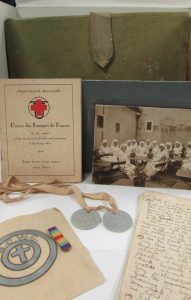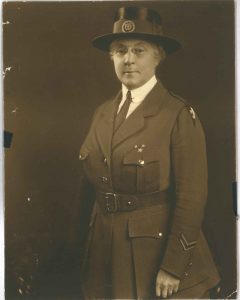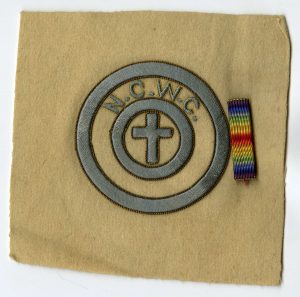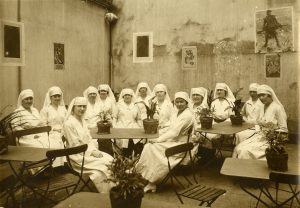
Imagine you purchased a box of used books and found buried within a tattered satchel dating from the First World War. What would you do with it? This scenario played in the summer of 2016, when a thrift store benefiting an Alabama-based women’s shelter contacted the CUA Archives. Hidden within a box of cookbooks – donated by an unknown person – was an old satchel containing the personal diary, correspondence, pamphlets, medals, and photos belonging to one Margaret Millar. A figure long since known to the Archives, but whose personal effects were thought lost. The shelter generously donated the satchel and its contents!
“Mother Millar,” or Margaret Richards Millar, was the head of the “Women Workers” sent to France by the newly-formed National Catholic War Council (NCWC) as part of the Committee on Special War Activities. Roughly a century ago, as the United States increased its role in the First World War, the NCWC – predecessor to today’s USCCB – organized social clubs for the American Expeditionary Force. Placed throughout Western Europe, these clubs were operated by female staff, and necessitated a strong-willed and well-connected person to get the project off the ground in war-ravaged Europe. Millar was just that person.

Born in 1858 in Vermont to Jonas DeForest Richards and Harriet Bartlett Jarvis, Millar was the second of three children and only daughter. Her family was of a distinguished New England line, which included a maternal grandfather, William Jarvis, who served as Thomas Jefferson’s and James Madison’s envoy to Spain and Portugal. Her father, a New England Congregationalist pastor, decided late in life to move the family to the American South. Immediately following the end of the Civil War in 1865, the family relocated to Alabama, having purchased a cotton plantation in Wilcox County. Both Millar’s father and older brother who later served as Wyoming state governor, DeForest Richards, became involved in county and state politics, with the former serving in the State Legislature (1867-1872) and as interim president of the University of Alabama (1869-1870) and the latter as county sheriff and treasurer.
Millar was educated at home and ultimately obtained a degree from the Bradford Academy in Massachusetts in 1880. By that point, her family had relocated to the American West, settling in the Nebraska panhandle and the Wyoming Territory. Marrying Stocks Millar, a Scottish immigrant educated at the University of St. Andrews, she spent her married life on the Wyoming plains, where she developed a reputation as a generous hostess for army personnel stationed in the Territory. At this time, her younger brother, Bartlett Richards, became a prominent cattle baron near Chadron, Nebraska, ultimately running afoul of federal land law and being imprisoned under Theodore Roosevelt.

When her husband passed away in 1890, she spent the next several years in France and Germany with their three children. In 1896, she converted to Catholicism alongside her son, future Jesuit Morehouse F. X. Millar (later a collaborator with CUA professor John A. Ryan). In 1918, as a representative of the American Bureau of Education, she was sent to France to recruit French women to attend college in the United States. Remembered for her charity towards the military in Wyoming and having already navigated war-torn France, Millar was a natural choice to lead the NCWC’s efforts in establishing service member clubs.
In the summer of 1918, she was sent back to France as a representative of the Committee on Special War Activities of the NCWC, in order to organize and supervise service clubs for American soldiers. She would open the Etoile Service Club in Paris that same year. In May 1919, she also was sent by the NCWC as the only American Catholic delegate to the International Congress of Women in Switzerland, serving alongside Jane Addams. Held concurrently with the Versailles Peace Conference, Millar felt challenged but firm in her beliefs as she wrote of an openness to discussion among the various parties assembled.
In October 1919, Millar was unexpectedly recalled to the United States by Rev. John Burke, head of the NCWC. This recall, following complaints by some of the women she supervised, led to protests by the majority of the service club staff and members of the American forces in France. As she prepared to depart the continent, Millar was inundated with letters and petitions from fighting to get her reinstated. In one such letter, a coworker writes:
The boys all love you as they do their own mother and they realize what your going will mean to them. My only desire to remain at the Club now, to work, for our boys is because it was your most beloved treasure of happiness for others and being the one thing that remains with us to express in unspoken language the good wrought for others by your love and kindness.

While Millar appreciated the support, she did not return to Paris, but remained in Texas the following year, helping to organize the first conference of the National Council of Catholic Women (NCCW), held in 1920. An active member of the NCCW and NCWC for the remaining years of her life, Millar passed away in 1947.
Her papers are available for research. The online finding aid may be found here, and a digital collection may be found here.

One thought on “The Archivist’s Nook: “Mother” Millar’s Mission – Catholic Women’s Service in WWI”